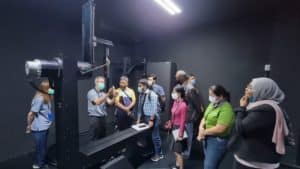In August 2022, representatives from several key government agencies and test facilities from Pakistan, including the Ministry of Science and Technology, the Pakistan Council of Scientific and Industrial Research (PCSIR), National Institute of Electronics (NIE) and the Centre for Energy Research and Development (CERAD) spent four days at the Electrical and Electronics Institute (EEI) in Bangkok, Thailand to reinforce and develop the national capabilities for lighting product testing.

With this in mind, the Delivering the Transition to Energy Efficient Lighting in Residential, Commercial, Industrial, and Outdoor Sectors project in Pakistan included capacity building for Pakistan’s testing laboratories in preparation for the onset of monitoring, verification and enforcement activities for the minimum energy performance standard and labels regulations.
The study tour was conducted between 8-11 August 2022 for relevant staff from Pakistan, along with two representatives from the Sudanese Standards and Metrology Organization (SSMO) as special guests representing the Energy Efficient Appliances and Lighting in Sudan project, with the aim of sharing experiences and practices with the relevant technical equipment, acquiring new knowledge on terminology, calibration and test methods, and exchanging with their Pakistani peers.
The four-day programme for the study tour was carried out at EEI, which is an industry specific institute under the supervision of the Ministry of Industry in Thailand founded in July 1998. The services provided by its Operation and Standards Center include electrical and electronic product testing, measuring instrument calibration and factory quality inspection, all of which are accredited by the Thailand Industrial Standards Institute and the National Accreditation Council.
The training was delivered by EEI laboratory staff and experts, with support from the International Institute for Energy Conservation (IIEC), who also coordinated all the logistics for the study tour. United Nations Environment Programme United for Efficiency International Lighting Expert, Steven Coyne, also attended to provide technical assistance to the participants if required.
The programme involved touring EEI’s laboratory facilities, inspecting measurement equipment relevant to testing requirements for energy efficient lighting regulation, observing testing being carried out on lighting artefacts and participation in seminars provided remotely by staff at the National Institute of Metrology of Thailand presenting materials on theory and practice in photometric testing. Its objective was to ensure that at the end of the study tour the participants were all:
- Competent at conducting in-house calibrations of laboratory equipment.
- Experienced in undertaking a proficiency testing activity.
- Capable of investigating and identifying equipment faults/inadequacies and flaws in testing procedures and have an understanding of the processes to ascertain remedial actions.
- Familiar with the requirements for establishing a new photometric test facility.
- Knowledgeable in the competent operations of the technical and administrative aspects of an accredited test facility.
- Competent in the conduct of key test methods required for MVE activities regulating MEPS of lighting products.
The study tour presented the good opportunity to carry out the final stage of the inter-laboratory testing exercise that formed part of the wider project. The participants were able to observe the LED lamps that they had already tested at laboratories in Pakistan being brought to EEI to be retested throughout the training. A face-to-face review of the results from both sets of testing was carried out on the final day of the study tour. This allowed detailed discussion of any significant variations between the laboratories, and the possible causes for these, and proved a valuable insight for participants on the processes and their value in resolving such inaccuracies of measurement.
Throughout both the classroom style and laboratory operation activities of the program, attendees asked many pertinent questions of the EEI staff. It was evident from the questions that the attendees were engaged in the training and the material presented was relevant to their needs in relation to building knowledge and testing capability.
Mr Touqeer Hussain Shah, from NIE, said, “This was an experience of a lifetime for me. I found it really instructive to see such advanced testing equipment, especially the electro-magnetic laboratory, which was a new thing for me.”
Mr Imran Ali Shah, from CERAD, echoed this sentiment, saying, “This gave me a new perspective of better performance and I was humbled to get this training experience using out-class exposure of technology, discipline, management and culture.”
For full details of the study tour, click here to download a copy of the case study.